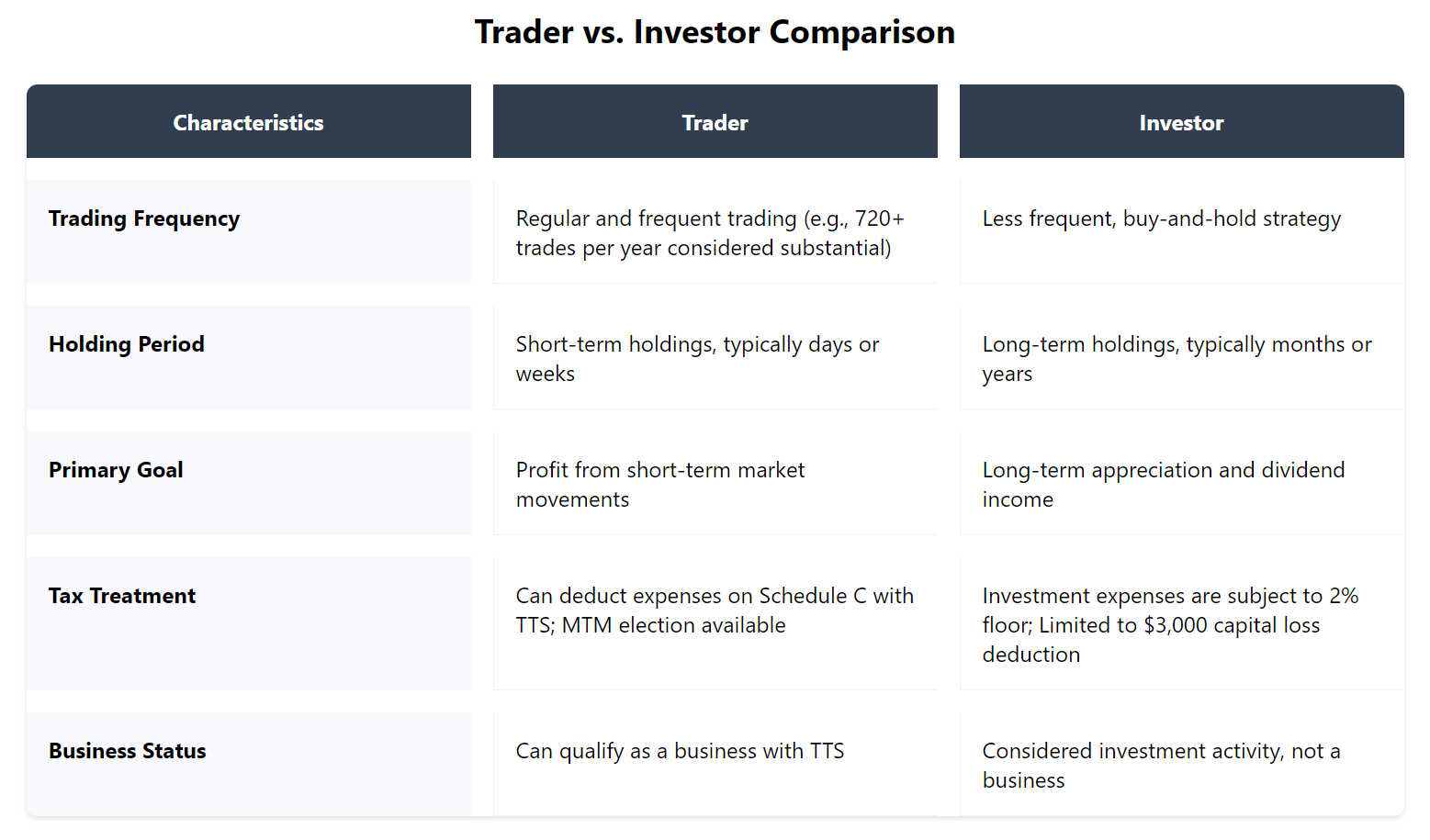The life of an active trader can be thrilling, offering the potential for substantial financial gains. However, the tax implications of frequent trading can be complex and often catch traders by surprise. At XOA TAX, we’re dedicated to helping traders like you navigate these complexities and optimize your tax strategies. This updated blog post will delve into trader tax status, deductions, wash sales, mark-to-market accounting, and LLC formation, all within the context of the 2024 tax year (filing in 2025).
Key Takeaways
- Understanding the IRS definition of a trader is crucial for tax purposes.
- Trader tax status (TTS) unlocks valuable deductions and opportunities.
- Mark-to-market accounting can offer significant advantages for eligible traders.
- Staying informed about wash sale rules is essential for tax efficiency.
- Forming an LLC can provide additional benefits and flexibility for traders.
Are You a Trader in the Eyes of the IRS?
The IRS differentiates between investors and traders. Investors typically buy and hold securities for long-term appreciation, while traders actively engage in frequent buying and selling with the goal of profiting from short-term market fluctuations. For the 2024 tax year, understanding this distinction is paramount.

Qualifying for Trader Tax Status (TTS)
Achieving TTS can significantly impact your tax liability. The IRS considers several factors:
TTS Qualification Checklist
Meet these criteria to qualify for Trader Tax Status
Profit Motive
- Primary goal is short-term market gains
- Focus on daily market movements
- Not primarily seeking long-term appreciation
- Trading is treated as a business activity
Substantial Activity
- High volume of trades relative to portfolio size
- ✓ 720+ trades per year: Typically qualifies ✗ 40 trades per year: Usually insufficient
- Significant time dedicated to trading
- Multiple trades executed most trading days
Regularity and Continuity
- Trading occurs most market days
- Consistent trading throughout the year
- No extended periods without trading
- Trading is your primary business activity
- Profit Motive: Do you primarily seek to profit from daily market movements rather than long-term appreciation? This means your primary intent should be to capitalize on short-term price fluctuations, not long-term growth.
- Substantial Activity: Do you engage in frequent and significant trading activities? While there’s no specific threshold, courts have recognized traders making 720 trades per year as meeting this requirement, while others making only 40 trades per year have been denied TTS. The volume and frequency of your trades relative to your account size are key considerations. For instance, making 100 trades per year in a $10,000 account may be considered substantial, while the same number of trades in a $1,000,000 account might not be.
- Regularity and Continuity: Are your trading activities conducted consistently and regularly throughout the year? This means trading should be a regular part of your routine, not just sporadic activity.
Meeting these criteria allows you to deduct trading-related expenses as business expenses on Schedule C of your tax return. These expenses might include:
- Trading software and platforms
- Education and training materials (courses, seminars, books)
- Market data subscriptions
- Home office expenses (if you have a dedicated space for trading that meets IRS requirements)
- Professional dues and subscriptions
However, it’s important to remember that not all trading expenses are automatically deductible; they must be directly related to your trading activity. For example, entertainment expenses or travel unrelated to your trading business would not be deductible.
Unlocking the Benefits of Mark-to-Market (MTM) Accounting
Electing MTM accounting under Section 475(f) offers distinct advantages:
- Ordinary Income Treatment: Gains and losses are treated as ordinary income, which can be particularly beneficial in years with losses, as it avoids the $3,000 capital loss limitation that applies to investors. This means you can deduct your full trading losses against other income.
- Exemption from Wash Sale Rules: MTM accounting eliminates the application of wash sale rules, which disallow losses from the sale of securities if you repurchase substantially identical securities within 30 days before or after the sale.
However, it’s important to consider the potential downsides of MTM. For example, you’ll lose the ability to take advantage of lower long-term capital gains tax rates if you hold securities for longer than one year. Also, the MTM election is generally irrevocable, meaning you cannot easily switch back to the standard accounting method.
How to Elect MTM for the 2024 Tax Year
To elect MTM, you must file a statement with your 2023 tax return (due April 15, 2024) clearly stating your intention to adopt MTM accounting for 2024. This statement must include specific language and details as outlined by the IRS, including:
- A declaration that you are a “trader in securities” (for those trading stocks, bonds, and options) or a “trader in commodities” (for those trading futures and commodities).
- A specification of the type of securities or commodities to which the election applies.
- A statement that you are electing to use MTM accounting under Section 475(f) of the Internal Revenue Code.
You’ll also need to submit Form 3115, “Application for Change in Accounting Method,” with your 2024 tax return filed in 2025. Keep in mind that the MTM election is generally irrevocable, so careful consideration is crucial.
Navigating the Wash Sale Rules
Understanding the Wash Sale Rule
30-Day Window Before and After a Sale at Loss
Examples of Substantially Identical Securities
Company Stock
- Same company’s common stock
- Stock options of same company
- Stock rights and warrants
ETFs & Mutual Funds
- Different share classes of same fund
- Mutual funds with identical holdings
- ETFs tracking same index
Derivatives
- Call/Put options on same stock
- Futures contracts on same security
- Contracts for difference (CFDs)
If you don’t elect MTM, wash sale rules apply. A wash sale occurs when you sell a security at a loss and repurchase the same or substantially identical security within 30 days before or after the sale. These losses are disallowed for tax purposes and added to the cost basis of the repurchased security. This rule applies to stocks, bonds, options, and even cryptocurrency.
Here are some examples of substantially identical securities:
- Shares of the same company (e.g., buying Apple stock after selling Apple stock at a loss)
- Options contracts with the same strike price and expiration date on the same underlying security
- Warrants or rights to purchase the same security
- Contracts for difference (CFDs) on the same underlying asset
Forming an LLC: Added Benefits for Traders
Establishing an LLC for your trading activities can provide:
- Liability Protection: Your personal assets are protected from business liabilities. This means that if your trading business incurs debts or faces lawsuits, your personal assets (like your home or personal bank accounts) are generally shielded.
- Tax Flexibility: You can elect to have your LLC taxed as a sole proprietorship, partnership, S corporation, or C corporation. The optimal choice will depend on your individual circumstances and state tax laws. For example, an S corporation election might allow you to pay yourself a salary and take distributions, potentially reducing your self-employment tax burden.
- Business Expense Deductions: Deduct health insurance premiums, contribute to a Solo 401(k) retirement plan, and potentially take advantage of other business deductions.
It’s important to note that state tax laws regarding LLCs can vary significantly. Some states may impose franchise taxes or require minimum annual fees, while others may offer tax advantages. Consulting with a tax professional is essential to determine the best LLC structure and tax classification for your specific state.
Key Deadlines for the 2024 Tax Year
- April 15, 2024: Deadline to file your 2023 tax return and elect MTM accounting for 2024.
- April 15, 2025: Deadline to file your 2024 tax return, including Form 3115 if electing MTM.
New Reporting Requirements for 2024
Be aware of the following new reporting requirements for the 2024 tax year:
- 1099-B Reporting: Brokers are now required to report wash sales on Form 1099-B, making accurate record-keeping and reconciliation with broker statements even more critical.
- Cryptocurrency Trading: The IRS treats cryptocurrency as property, meaning gains and losses from trading are subject to capital gains tax rules. You’ll need to report these transactions on Form 8949 and Schedule D of your tax return.
- Digital Asset Reporting: New digital asset reporting requirements are in effect, requiring taxpayers to report certain transactions involving digital assets, such as receiving more than $10,000 in cryptocurrency as payment for goods or services.
Essential Record-Keeping Checklist for Traders
Maintain these records to support your trader tax status and deductions
Trade Documentation
Business Expenses
Supporting Documentation
FAQ
1. How do I know if I meet the criteria for TTS?
The IRS doesn’t have a clear-cut definition, so it’s best to consult with a tax professional experienced in working with traders. They can help you assess your trading activity, frequency, and intent to determine if you qualify. A relevant case highlighting the complexities of TTS is Endicott v. Commissioner, T.C. Memo. 2013-199. In this case, the taxpayers disputed the IRS’s determination of tax deficiencies, arguing that Mr. Endicott’s trading qualified him as a “trader in securities.” However, the Tax Court found that his activities lacked the necessary frequency and regularity to qualify for trader status, emphasizing the importance of meeting specific criteria. This underscores the need for careful assessment of trading activities and professional tax advice.
2. What are the advantages of MTM accounting beyond wash sale exemptions?
MTM allows you to take advantage of potential tax loss harvesting strategies and can simplify your accounting by eliminating the need to track wash sales.
3. What are the record-keeping requirements for traders?
Maintain detailed records of all trades, including dates, times, entry and exit prices, and commissions. Keep receipts for all trading-related expenses. Contemporaneous record-keeping is essential, meaning you should document your trades and expenses as they occur.
4. Can XOA TAX help me with setting up an LLC?
Absolutely! We can guide you through the process and advise you on the best tax structure for your specific situation.
Tax Planning Throughout the Year
Proactive tax planning is crucial for traders. Throughout the year, consider strategies such as:
- Tax Loss Harvesting: Offsetting gains with losses to minimize your tax liability. This involves selling securities at a loss to offset capital gains realized from other sales.
- Timing Your Trades: Strategically timing your trades to manage your tax obligations. For example, you might consider delaying the realization of gains until the next tax year or accelerating losses into the current year.
- Retirement Contributions: Maximizing contributions to retirement accounts like a Solo 401(k) to defer taxes and save for the future. With a Solo 401(k), you can contribute both as an employee and an employer, potentially contributing significantly more than you could to a traditional IRA or 401(k).
Additional Resources
- IRS Publication 550 (Investment Income and Expenses)
- IRS Publication 538 (Accounting Periods and Methods)
- Endicott v. Comm’r, T.C. Memo. 2013-199 (a landmark case on trader tax status)
Connecting with XOA TAX
Understanding the nuances of trader taxation can be challenging. At XOA TAX, we specialize in helping traders like you optimize their tax strategies. Whether you need help determining your trader status, electing MTM accounting, navigating wash sale rules, forming an LLC, or developing a comprehensive tax plan, our team of experienced CPAs is here to assist you.
Contact us today for a consultation:
Website: https://www.xoatax.com/
Phone: +1 (714) 594-6986
Email: [email protected]
Contact Page: https://www.xoatax.com/contact-us/
Disclaimer: This post is for informational purposes only and does not provide legal, tax, or financial advice. Laws, regulations, and tax rates can change often, and vary significantly by state and locality. This communication is not intended to be a solicitation and XOA TAX does not provide legal advice. Please consult a professional advisor for advice specific to your situation.




 anywhere
anywhere  anytime
anytime